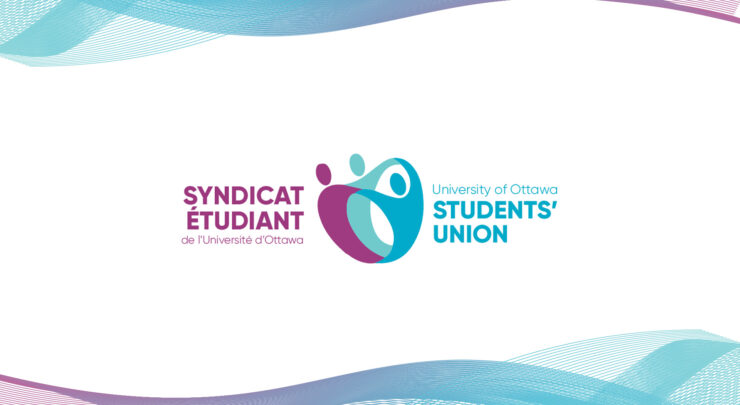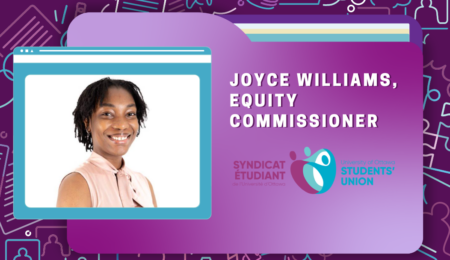Max Christie is “fucking furious” and “the OFL is based”
On May 28, the Board of Directors (BOD) of the University of Ottawa’s Students Union (UOSU) met for their monthly meeting. Beginning at noon and wrapping up just after 6:30 p.m., the meeting included appointing the recently hired interim executive committee commissioners as well as the interim directors appointed by Registered Student Governments (RSGs) of the faculties with vacant seats of the BOD.
Additionally, there was extended discussion on a motion regarding the reimbursement of travel costs for a speaker at the UOSU’s Black History Month gala, and a motion was passed for the union to make a statement of support for the Ontario Federation of Labour’s ‘Enough is Enough’ campaign.
The BOD’s directors began by amending the meeting’s agenda to discuss the matter of reimbursing a speaker’s travel expenses. Here are some of the most important motions discussed.
Motion A) Appointment of interim directors
The discussion on the appointment of interim directors for the board centred on each RSG’s process for the appointment. The chair of the BOD, Delphine Robitaille, reached out to the RSG presidents of departments with vacant seats on the BOD and got a description of their process for appointing interim directors.
For example, the executive committee of the Telfer Student Association (AÉTSA) sent Robitaille a signed letter of their nomination choice, whereas the Engineering Student Society (ESS) sent an 11-page PDF of their process.
Former UOSU president and current social science director, Armaan Singh, raised questions about the process for removing interim directors and the AÉTSA’s appointment process. Singh eventually made an amendment to the motion to remove the AÉTSA’s recommendation until UOSU receives more details on the selection process.
This amendment failed, with board members debating that different RSGs have different means of reaching out to students about the director appointing process.
The discussion then returned to the main motion which passed, with only Singh in opposition. The interim directors will begin their duties as of the next planned BOD meeting.
Motion D) Debate on the Black History Month Gala/Wes Hall Controversy
UOSU held its annual Black History Month Gala on Feb. 25, in collaboration with the Global Black Coalition. Wes Hall, entrepreneur and an investor of Dragon’s Den fame, was invited and presented with an award.
However, the previous operations commissioner made a verbal agreement that UOSU would pay for the expenses incurred by Hall and his assistant. As a result, Hall issued two invoices for his travels for a total of $5997.32, through his corporation WeShall Inc. In Ontario, verbal agreements are considered legally binding contracts.
This violated UOSU’s procurement policy, (passage of the policy violated), and legal counsel advised the members of the executive committee to pay the costs to avoid a potential lawsuit. News of the gala costs first became known on Reddit on May 18th, but the original post (and account) have since been deleted.
Fiona Broughton, the current operations commissioner, argued that UOSU is liable for the payments and would be in the union’s best interest to pay the fees. However, she said that quotes were not received beforehand and the policy outlines that three quotations [for approval] are required for purchases over $5000.
Broughton also acknowledged that despite asking (and not receiving) receipts for the travel expenses, documentation was poor for both parties and it has been about three months since the invoices were initially sent.
Many board members (including then-president Singh) expressed they were not aware of the matter when it occurred in February and raised concerns about how the matter was handled within the organization.
Arts director Hannah Wiedrick, who is serving a second term on the board, claims that the invoice issue was not brought to the previous board. As a member of the executive oversight committee (EOC) in the last term, Wiedrick expressed concern with how the matter was handled. “I heard about it in backrooms, but there was nothing I could do about it because those were rumours that it might have happened,” she said.
Quanah Traviss, the Indigenous Students Association director, asked Singh when he was aware of the invoice issue and why it was not brought to the board then. Singh claimed he learnt of the matter in April, which was when the previous executive committee was initially seeking legal counsel and that the executive committee declined to pay.
Social science director Max Christie wanted it on the record that he was “fucking furious” regarding the events and proposed an amendment that the current EOC be assigned to investigate the matter.
After debating a timeline and the offer to write a report by Broughton, the friendly amendment passed, as well as the overall motion to pay the invoices on behalf of UOSU.
Motion H) Establishing an Executive Code of Conduct
After a 15-minute recess, the BOD reconvened to discuss a motion regarding the creation of a code of conduct for the executive committee. James Adair, the director for social sciences, argued that not signing a code of conduct – especially in regard to motion D – would be unacceptable.
Wiedrick agreed with the idea of a separate code of conduct for executive committee members. Broughton also favoured the motion, identifying that a common issue between the Board and UOSU is workplace conduct. She then suggested, in the case of an executive committee member investigation by the EOC, the concluded result be made public to the Board.
Singh countered this, preferring that ongoing investigations be known to the board while avoiding privacy concerns. Broughton re-explained that certain details of the investigation shouldn’t be known to the Board, as the investigative process is private and safe.
This motion was tabled for further discussion at the BOD’s next meeting.
Motion D) Independent Ombudsperson Hiring
Moved by Christie and seconded by Brandon Ly, director of social sciences, this motion discusses the importance of hiring an ombudsperson, which is mandated in article 17.2.1 of UOSU’s constitution.
“Having an independent person to help with oversight is really useful, it is constitutionally required, and we’ve gone over two years without one,” said Christie. “[Hiring an ombudsperson] is a board-driven process and we’re the only ones with the power to remove the ombudsperson with a three-quarters vote.”
Singh makes a friendly amendment to the motion to ensure that the ombudsperson is a non-member of UOSU, so they are removed from the interpersonal environment that exists in student politics.
The motion passes.
Motion E) Student-Driven Meetings
Moved by Christie and seconded by Wiedrick, the motion’s objective is to schedule 15 minutes of discussion from students for future BOD meetings, as regulated by the chair of the board. Each student would be permitted to speak for one minute.
Singh spoke in favour of the motion but questioned the proper distribution of speaking time for students who wished to participate in board meetings. He amends the motion to ensure the Chair and their team regulate speaking time.
Advocacy commissioner Maisy Elspeth spoke in favour of the motion but raised the suggestion of a code of conduct for students to speak at board meetings. Although she cited anxious lines of thinking, she was worried about the potential harassment or aggression from students against the executive committee and board members.
Adair was less in favour of the motion. “I worry that it may become a culture for members of the board or certain groups to get to their friends to show up and repeat the same thing over and over again,” he said. “We’ve seen how [people] talk to members of the board in a…less than kind way on various platforms. I’m sure that, face-to-face, people be slightly more kind.”
Broughton believed the motion is a good idea, but is a bandaid solution to the larger problem of lack of communication between the board and students. She proposed the return of town halls for students, as voicing their concerns to UOSU is important. “I don’t think that we’ll be able to give those students as much consideration as we should.”
With greater debate as to how to provide platforms for students to communicate with UOSU, such as office hours for board members and promotions from RSGs, the motion passes with two abstentions.
Motion I) Constitutional Suspension
Moved by common law director Gabrielle Muzychka, this motion calls for the suspension of article 5.10.1.3 of the UOSU constitution, which reads, “Executives who are international students must not earn credits in the spring-summer term and can take 12 credits in the fall term, and 12 credits in the winter term.”
The former chair of the board had failed to update the constitution until April, after the election of current equity commissioner Joyce Williams, who had earned the position under the impression that she could take summer courses while employed on the executive committee. The meeting in which these changes were approved was held on Jan 21.
Muzychka said that UOSU failed to make this information accessible. “Meeting minutes do not suffice to keep students in the know of UOSU’s constitutional changes,” said Muzychka. She additionally highlighted that important documents for international students – such as VISAs and housing leases – rely on course enrollment.
Williams explained that there were already attempts to work around this article of the Constitution, to two options: to resign as is or continue her courses and her job. The directors agreed that the Constitution was an oversight of UOSU and the governance committee is already reviewing the article.
This motion passed unanimously, with only Williams abstaining.
Motion J) Discord Ad-hoc committee
Thorp and Traviss, both members of the communications and engagement committee, moved to create a committee to investigate creating a Discord server for UOSU. They argued that there currently is no live communication platform between UOSU and students, and the committee can investigate the benefits and functionalities of creating a Discord server.
This motion was met with hesitancy from some members, who noted concerns of harassment on the platform. Thorp responded to this by claiming that several members of the U of O community already use Discord for club affairs and class discussions.
He also claimed that there are already 8,500 members on one U of O Discord server and “harassment can’t be a reason why we don’t use Discord” when other platforms also report high numbers of user harassment.
The motion passed. Directors Singh, Abigail Lyons, Muzychka, and Broughton voted in opposition to the motion.
Motion L) PIVIK & Food Bank Purchasing Approval
Moved by Broughton and seconded by Adair, the motion seeks an exemption for the restocking orders of PIVIK and the Food Bank from being approved by the executive committee, but rather the Director of Services. Broughton argued that PIVIK and the Food Bank make predictable orders for replenishing stock and exempting the executive committee from routine approval can avoid delaying the process.
“The Food Bank has about 400 users a month, increased usage by 200 per cent, and has previously closed once or twice due to no stock,” Adair explained, speaking in favour of the motion.
This motion would only apply to the restocking of PIVIK and the Food Bank and not any other expenses that the services might incur, which would adhere to UOSU’s procurement policy.
The motion passed, with one abstention.
Motion M) ‘Enough is Enough’ campaign
Added to the agenda by Singh, the motion would be a public declaration of support by UOSU for the Ontario Federation of Labour’s (OFL) ‘Enough is Enough’ campaign.
The OFL has outlined five core demands from their campaign: wage increases that align with the increased cost of living; keeping schools and health care public; affordable groceries, gas and basic goods; rent control and affordable living; and holding banks and corporations accountable.
After a brief discussion surrounding the organization’s political affiliation (“the OFL is based”), the directors spoke in favour of supporting the campaign, as it aligned with student interests. The motion passed, with four abstentions.
You can read the BOD’s agenda here.





